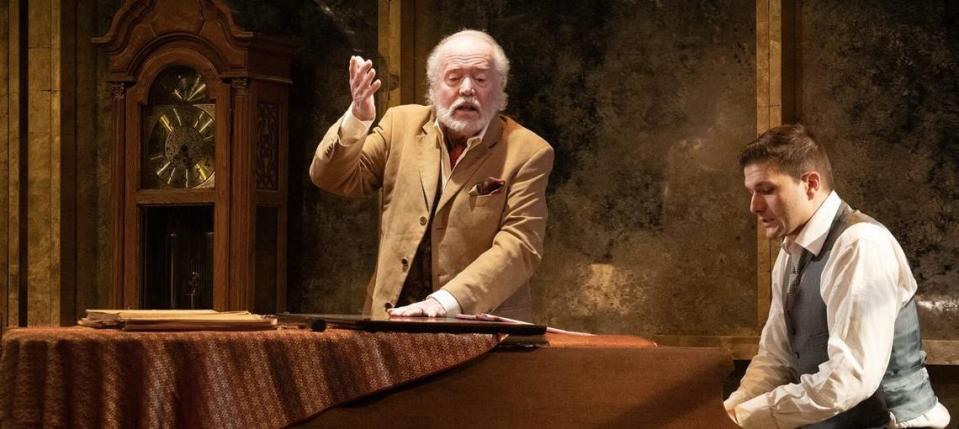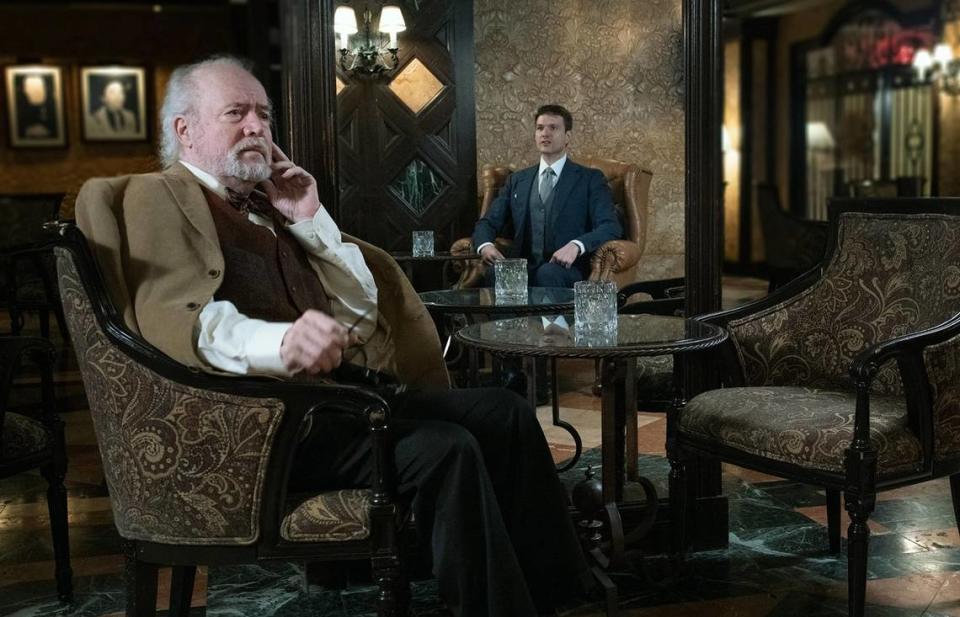Theater review: ‘Old Wicked Songs’ answers the call of drama with music
When Bari Newport arrived in South Florida to begin her tenure as producing artistic director at GableStage a couple of years ago, one of her innumerable tasks involved asking the theater’s patrons what they’d like to see more of in the company’s intimate space at the historic Biltmore Hotel.
Plays with music, they told her, something that had been a rare but Carbonell Award-winning part of late producing artistic director Joseph Adler’s programming. Newport listened, and the result – “Old Wicked Songs,” written and directed by Jon Marans – opened for a run through Sunday, Feb. 4.
The play, which was a finalist for the Pulitzer Prize in 1996 (“Rent” won that year), is set in Vienna in 1986 while former United Nations Secretary-General Kurt Waldheim – whose past as an intelligence officer in the Wehrmacht (Nazi armed forces) had been recently revealed – was running his successful campaign to become president of Austria.
Marans pairs two disparate pianist/musicians in “Old Wicked Songs,” which was inspired in part by his own studies in Vienna.
Professor Joseph Mashkan (Keith Baker) is drawing closer to the end of a diminishing career, though despite having to overcome repeated obstacles and objections from his newest (and only) student, he proves himself an insightful teacher.
Stephen Hoffman (Teddy Warren) is a 25-year-old American piano prodigy who has lost the spark that compelled him to play. He has come to Vienna to study accompaniment, only to discover that he must first study singing with Mashkan, the better to understand the interplay of singer and accompanist. Together they’ll work on Robert Schumann’s Dichterliebe, a song cycle with words taken from the poetry of Heinrich Heine.
Feeling outraged and deceived, the inflexible Hoffman threatens to leave but doesn’t. Good thing. Otherwise the audience would miss out on two hours of a compelling play-with-music about two eccentric men who help to change each other’s lives.
The play, Marans’ first, requires a pair of performers who can act, sing and play piano at an impressive level. Marans turned to Baker (whom he directed in a production of “Old Wicked Songs” 14 years ago in Pennsylvania) and Warren, a Miami transplant from Milwaukee. Both men are masterful in all three facets of their roles.
Baker utilizes a courtly charm that hides Mashkan’s justifiable worries about his future and diminishing funds. Secrets lie beneath the layers of his personality and the very shirt on his back. He sings Mashkan’s sections of the Dichterliebe in a baritone appropriate to the professor’s age, and if his adept piano playing sometimes includes a mistake or two, that’s in the script.
Warren’s Stephen is so tightly wound it’s surprising his hair doesn’t stand straight up, or perhaps the character is meant to be on the autism spectrum. His obsessive-compulsive behavior when he sits to play the piano involves a deep breath and tugging his ears three times. But wow, can he play.
Hoffman assures Mashkan that he’s not a prodigy, just a stylistic mimic, then delightfully demonstrates the truth of that statement. Warren is a better singer than Hoffman is supposed to be, so he sometimes pulls back vocally. But when the exhilarated student comes back from the opera and bursts into Mashkan’s rehearsal studio singing Vesti la Giubba from Pagliacci, Warren’s tenor soars.
That studio has been designed by Frank J. Oliva, with props by Marialexia Hernandez and set dressing by Nicole Quintana. Like Vienna itself, it’s visually of a different time and place, with its worn gold-brushed walls affording a peek to the outside, a stopped grandfather clock, and a phonograph with a colorful horn. And, of course, the shawl-draped piano.
Tony Galaska’s warm-hued lighting design, Sean McGinley’s sound design with its Dichterliebe bridges between scenes, and the costumes by Gema Valdes (Mashkan’s well-worn elegance for a man of a certain age, Hoffman’s evolving looks which reflect the changes within himself) deepen the artfulness of Marans’ story.
“Old Wicked Songs” contains jokes (Mashkan tells a bad but funny one about Waldheim), disturbing moments as the professor drops antisemitic remarks, and rage as Hoffman returns from a trip to the Dachau concentration camp, a visit he had promised his father he would make. World War II, the Nazis, the Holocaust – Hoffman learns about more than music during his time in Vienna.
Music – how to teach it, how to learn it, how subtle adjustments make all the difference – is the great strength of “Old Wicked Songs.” That Marans applied his insights as a writer, musician and director to GableStage’s version of his play is a multifaceted gift to the company’s audiences.
ArtburstMiami.com is a nonprofit media source for the arts featuring fresh and original stories by writers dedicated to theater, dance, visual arts, film, music and more.
If you go
WHAT: “Old Wicked Songs” by Jon Marans
WHERE: GableStage in the Biltmore Hotel, 1200 Anastasia Ave., Coral Gables
WHEN: 2 and 7 p.m. Wednesday, 8 p.m. Thursday-Saturday, 2 p.m. Sunday (additional 2 p.m. matinee Saturday, Feb. 3), through Feb. 4 (streaming version available during regular performances)
COST: $40, $45, $50, $55, $60, $65, all with additional $10 service fee (discounts for students, teachers, artists, military and groups); streaming ticket $30
INFORMATION: 305-445-1119 or gablestage.org.
RELATED EVENT: A conversation with Gerard Schwarz, artistic and music director of the Palm Beach Symphony and professor of music at the Frost School of Music, in honor of Holocaust Remembrance Day, will follow the 2 p.m. matinee on Sunday, Jan. 28. Visit gablestage.org/events for details.


